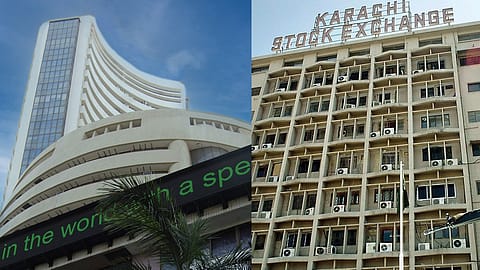Calm in India, turmoil in Pakistan: How stock markets in both countries reacted to Operation Sindoor
Indian equity market exhibited strong resilience and ended on a positive note, while Karachi Stock Exchange witnessed sharp selling as panic gripped Pakistani investors.

In an unprecedented development, India struck at the heart of terror in at least nine major terrorist facilities in Pakistan and Pakistan-occupied Kashmir (PoK) early this morning, which initially panicked share market investors in both the neighbouring countries. However, D-Street responded with resilience to the retaliatory strike by India, which was in response to a deadly terror attack in Pahalgam that left 26 civilians dead on April 22, while its counterpart, Pakistan Stock Exchange, crashed like a house of cards.
Early today, the Indian equity benchmark BSE Sensex opened 692 points lower at 79,949, and the NSE Nifty started the day at 24,233, down 146 points from the previous closing level. However, the domestic market quickly recovered after the initial dip as investors remained assured about the broader economic outlook, strong financial inflows, and robust macroeconomic fundamentals.
Staging a smart recovery of over 1%, the Sensex closed higher at 80,747, up 106 points, or 0.13%, and the Nifty50 rose 35 points, or 0.14%, to settle at 24,414. The broader markets outperformed benchmark indices as the BSE Midcap Smallcap indices rallied 1.36% and 1.16%, indicating the positive mindset of investors.
On the sectoral front, barring Nifty FMCG, pharma and healthcare, all other indices ended in green, with auto, media, realty and consumer durables adding over 1% each.
Pakistan Stock Exchange crashes amidst panic selling
On the flip side, investors in Pakistan turned jittery after Operation Sindoor.
Pakistan's benchmark Karachi Stock Exchange nosedived up to 6% in opening trade on Wednesday, falling as much as 6,272 points as panic gripped investors. Pakistan's KSE-100 index plunged 5.5% to 107,297 in the opening trade, from the previous closing level of 113,568. Finally, the Karachi Stock Exchange ended 3.1% lower at 110,047.
Recommended Stories
Since the Pahalgam attack, Karachi Stock Exchange has fallen over 7% amid fears of a strong retaliation by India in response to the atrocious terrorist attack in Jammu and Kashmir.
Earlier this week, U.S.-based rating agency Moody’s warned that sustained escalation in tensions with India would weigh on Pakistan’s growth and hamper the government’s ongoing fiscal consolidation. In comparison to stable macroeconomic conditions in India, Pakistan is dependent on external financing to run the country, while its foreign-exchange reserves remain well below what is required to meet its external debt payment needs for the next few years, the rating agency said.
Speaking on today's action on terrorist camps in Pakistan, foreign secretary Vikram Misri, in a press briefing, said that India has exercised its right to respond, pre-empt, and deter more cross-border attacks following the Pahalgam terror attack. The foreign secretary said India’s actions were “measured, non-escalatory, proportionate and responsible”.
Misri said India’s latest action could be seen in the context of United Nations Security Council’s press statement on April 25, 2025 following the Pahalgam terror attack underlining, “The need to hold perpetrators, organisers, financiers and sponsors of this reprehensible act of terrorism accountable and bring them to justice.”
(INR CR)
(DISCLAIMER: The views and opinions expressed by investment experts on fortuneindia.com are either their own or of their organisations, but not necessarily that of fortuneindia.com and its editorial team. Readers are advised to consult certified experts before taking investment decisions.)